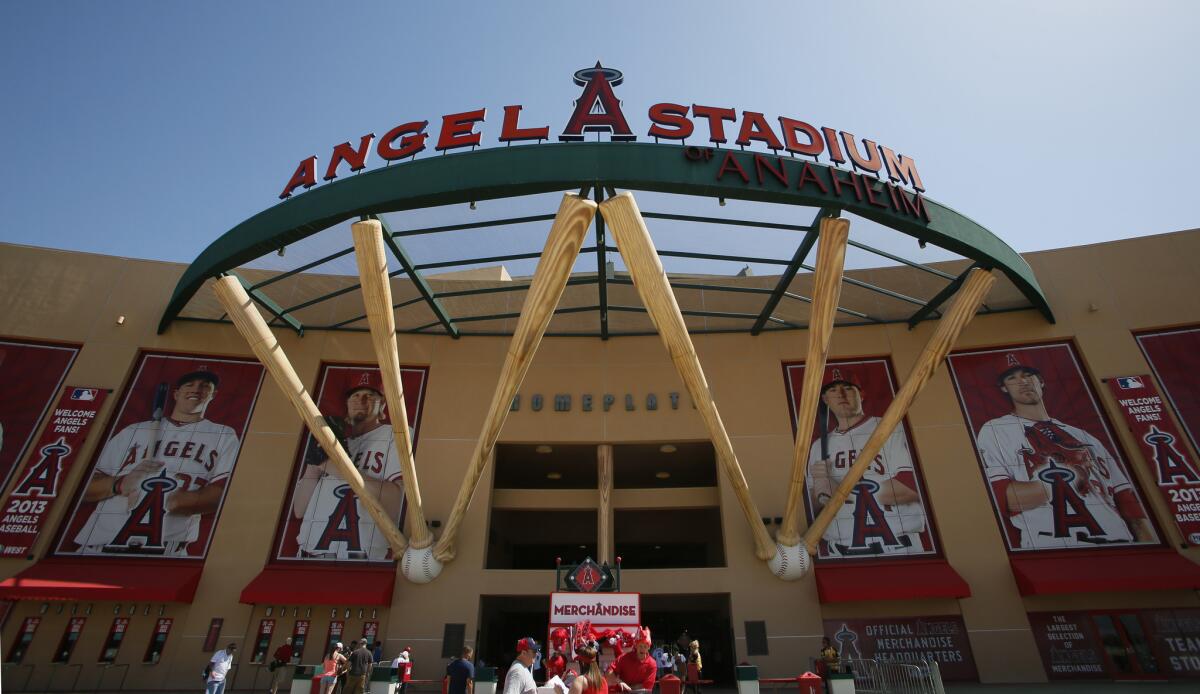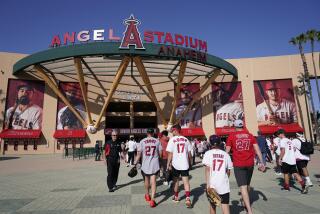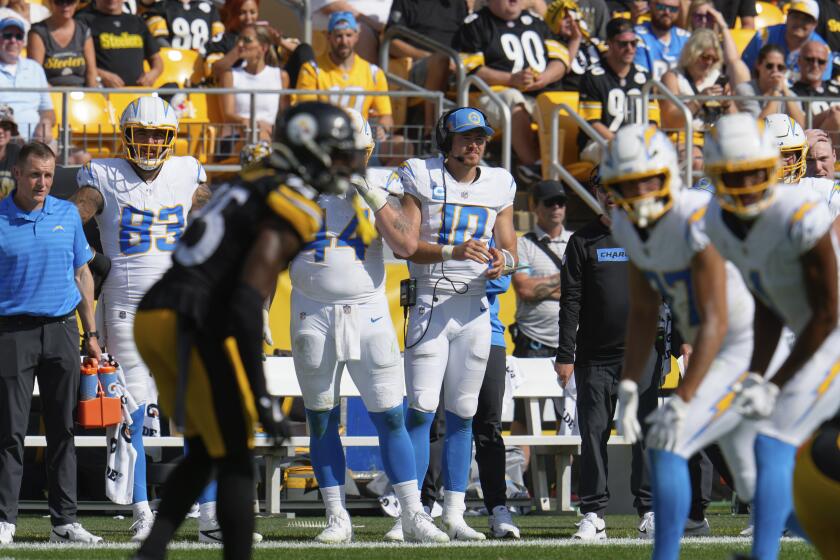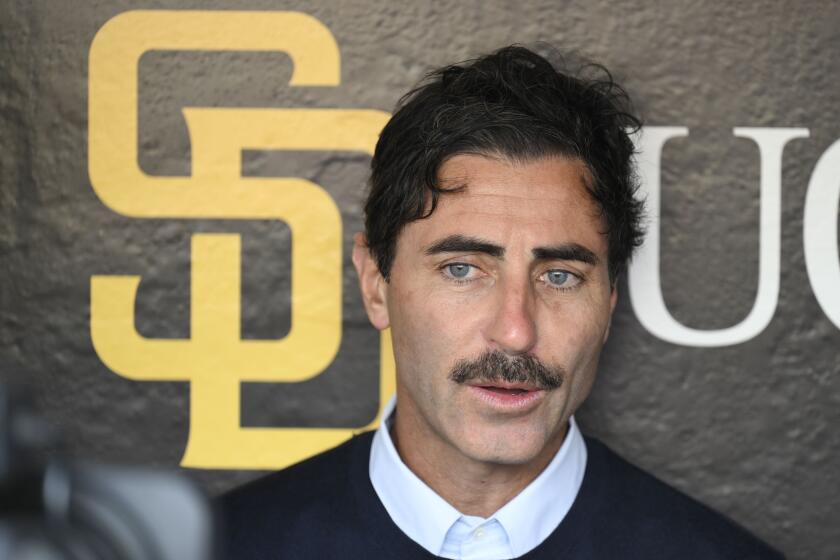Something has to give in stalled stadium lease negotiations between Angels and Anaheim

You’re the mayor. A guy walks into City Hall and offers to spend half a billion bucks to revitalize property owned by the city, at no cost to the city. What do you say?
If you’re Anaheim Mayor Tom Tait, you call it a taxpayer giveaway.
This is not a knock at Tait. This is a tip of the cap toward a mayor who has been so incredibly successful in framing the debate surrounding the Angels’ stadium lease negotiations that the process has ground to a dead halt.
It has been six months since the Anaheim City Council voted to approve the framework of a deal designed to keep the Angels in town for the long term, and to determine how to cover the estimated $150 million needed to keep Angel Stadium up and running for the long term.
The Angels first asked the city for cash. The city, properly, said no.
So the two sides agreed the Angels would cover that $150 million and, in exchange, would lease the land surrounding the stadium — the parking lots — for $1 per year. If the Angels successfully developed the land, they could make back that money, and maybe more.
In Anaheim, the mayor has one vote on the City Council. Tait was outvoted, 4-1, but he has publicly objected to proceeding with the deal ever since.
It is not so much that Tait is the voice of the opposition. It is that Tait is the only voice.
The other four members of the city council have remained silent, apparently taking political cover behind Tait. Anaheim has an interim city manager, on the job for two months. The city’s lead negotiator, Charles Black, resigned last month.
Angels owner Arte Moreno has remained silent too. He and other Angels officials have declined requests to explain why the deal would be good for the team and for the city.
“That’s because it’s not a good deal for the people,” Tait said.
Angels spokeswoman Marie Garvey said team executives would be happy to help sell the deal, if and when the city and the Angels finalize one.
“There is no deal,” Garvey said. “For us to discuss deal points that have not been agreed upon is misleading and unfair to the public.”
On Friday, the city is expected to release a long-awaited appraisal, with estimates as to what the fair market value of the site might be, with and without the Angels playing there. Previous city estimates have ranged from $30 million to $380 million.
But the city does not need an appraisal to realize the land is worth much more without a baseball stadium, and without the parking it requires. If this is all about the best financial option for Tait — and that would be an entirely honorable position, given that the revenue could go to police and fire services, youth sports, libraries and such — then the city should let the Angels play out their lease and go elsewhere.
“It doesn’t have to be the maximum best deal,” Tait said. “There’s a value you could put on having a hometown team.”
Tait has framed the deal as a taxpayer giveaway because the potential land value, and return from development, might far exceed the $150 million cited as the Angels’ contribution. Yet, if that land were so valuable, the city ought to have put up for bid the 45 acres, about a third of the land, that it can sell without the Angels having veto rights.
So long as the Angels play there, any significant development would require the construction of parking structures, to replace the spaces used for new buildings. That means, as the city has acknowledged, that the Angels are the most logical developer.
Two prominent developers, who reviewed the proposed Angels deal for The Times on condition of anonymity, estimated Moreno might spend $250 million to develop the site into something about as large as The Grove shopping and entertainment center in Los Angeles, about $150 million for construction, and about $100 million for parking structures. Moreno could take on a development partner, but that would be his responsibility.
And, given that Moreno would want money-making amenities as well as the required infrastructure improvements to stay at Angel Stadium, one major league owner estimated Moreno might put $200 million to $400 million into the ballpark, in all. The Dodgers’ new owners have spent $150 million over the last two off-seasons on stadium upgrades.
Add it up, and Moreno might be in for more than $500 million. In fact, when former Dodgers owner Frank McCourt made a 2004 pitch for long-term Dodger Stadium improvements that included shops, concessions, parks, team offices, a team museum and two parking structures, he estimated the cost at $500 million.
All of this, remember, at no cost to the city of Anaheim.
The developers contacted by The Times said the city should be concerned about the possibility of Moreno selling the team at a premium because of the development rights, then laughing all the way to the bank without developing anything. Tait is concerned, and rightly so, that Moreno could make windfall profits without the city getting a cent.
The Angels are believed to be willing to negotiate in such areas, for instance, to consider some revenue sharing, to bind the deal on any future owner and to discuss meeting development deadlines or letting the city take back the property.
However, with talks at a stalemate because of the way Tait has framed the issue, the Angels have flirted with Tustin and kept an eye on Los Angeles. If Moreno has to commit much more than $500 million, his best financial play might be to build himself a ballpark.
Moreno says he wants to stay in Anaheim. Tait says he wants the Angels to stay, and his diligence will result in a better deal than the one the city might have gotten six months ago. There is no reason a deal cannot get done, if only someone would speak up on its behalf.
Twitter: @BillShaikin
More to Read
Go beyond the scoreboard
Get the latest on L.A.'s teams in the daily Sports Report newsletter.
You may occasionally receive promotional content from the Los Angeles Times.











